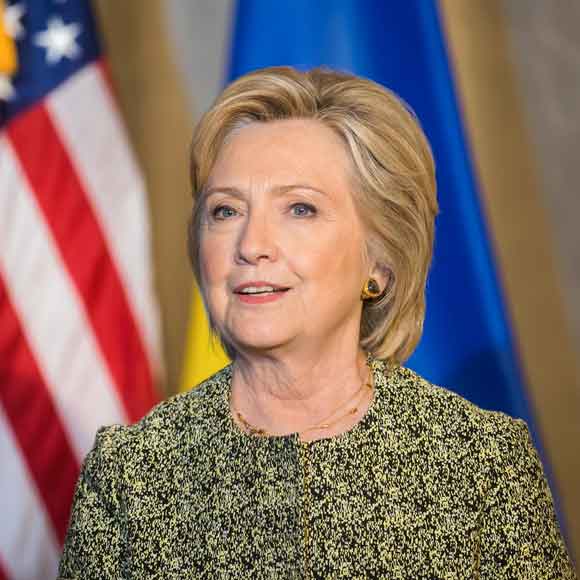Hillary Clinton, the former Secretary of State, recently expressed apprehensions regarding a prospective disinformation campaign against Vice President Kamala Harris. Clinton raised these concerns in an interview with Margaret Hoover, the host of ‘Firing Line’. She suggested that an effort to tarnish Harris’ reputation, referred to as an “October surprise,” might escalate this month, aiming to distort the vice president’s image before elections.
According to Clinton, the campaign could involve a coordinated effort to mislead voters about Harris’ record and personal character. Drawing upon her own experiences from the 2016 election, Clinton noted that such tactics often revolve around conspiracy theories and false narratives. She underscored that high-profile figures like Vice President Harris are prime targets for these tactics as elections approach.
Clinton cited the discredited “Pizzagate” conspiracy theory from 2016 as an illustration of how disinformation can become far-reaching and dangerous. This theory falsely linked her to a child trafficking operation based out of a pizzeria in Washington, D.C. The false narrative was widely circulated on social media and fringe websites, eventually leading a man from North Carolina to the pizzeria armed with an assault rifle, intending to “rescue” non-existent children.
This incident underscores the real-world dangers of viral misinformation. Clinton used this example to highlight how swiftly false narratives can escalate, warning that a similar disinformation campaign could target Harris in the run-up to the 2024 election. Clinton urged listeners not to dismiss the seriousness of such falsehoods and their potential for gaining momentum.
Clinton pointed out that these conspiracy theories often spread rapidly on social media platforms and fringe news outlets. “It starts online, often on the dark web,” she said, outlining the trajectory of disinformation from obscure internet corners to mainstream media. Once these stories are picked up by partisan media outlets, they can proliferate rapidly, reaching a much wider audience and gaining undeserved credibility.
Clinton’s concerns also extend to foreign interference in the 2024 election, reflecting the fears of cybersecurity experts in recent years. Countries like Russia, Iran, and China could exploit social media to disseminate false narratives about candidates, including Harris. “The digital airwaves will be filled with misinformation,” Clinton warned, underscoring the need for vigilance against falsehoods.
In the 2016 election, Russian operatives used social media to fuel divisive narratives and disinformation campaigns, undermining trust in the electoral process. Clinton suggested that similar tactics could be used now, with foreign actors fueling narratives specifically targeting Harris. She called for proactive measures by social media platforms to monitor and curb the spread of disinformation, and for media to consistently highlight the risks posed by false information.
“The press needs a consistent narrative about the danger Trump poses,” Clinton said, stressing the importance of diligent fact-checking and exposing misinformation before it becomes widely accepted. She urged the public to be skeptical of outrageous claims, particularly those designed to incite fear or doubt.
While admitting that the exact nature of the disinformation campaign against Harris is uncertain, Clinton was confident that something would surface. She urged voters, media, and political leaders to stay alert and prepared to counter any emerging false narratives.
“October surprises” traditionally refer to last-minute revelations or scandals affecting election outcomes. Clinton suggested that Harris, being the first female Vice President of color, could be particularly susceptible to disinformation campaigns exploiting biases and attempting to sow division among voters. These efforts could be part of a larger strategy to destabilize the political landscape by focusing on Harris’s race, gender, or past political record.
Clinton’s remarks come as the 2024 election approaches and concerns over disinformation are on the rise. Recent elections, both domestically and internationally, have demonstrated the power and pervasiveness of false information in shaping public opinion and voter behavior.
Recently, CBS News reported a disinformation campaign against Vice President Harris, linked to Russia, involving fabricated videos falsely accusing Harris of a hit-and-run accident. Iranian and Chinese groups are also implicated in attempts to disrupt U.S. elections.
A video widely circulated on social media in September, which attracted millions of views, showed a young Black woman accusing Vice President Harris of leaving her paralyzed from a hit-and-run accident in San Francisco, California, 13 years ago. However, soon after its posting, social media users began to point out discrepancies. Microsoft’s threat intelligence report later confirmed that the fabricated story originated from a Russia-linked troll farm.
“We’ve seen it before, and we’re seeing it again,” Clinton said, referring to her own experience in 2016. Reinforcing the peril of such situations, Clinton urged all Americans to remain vigilant against attempts to distort the truth.

